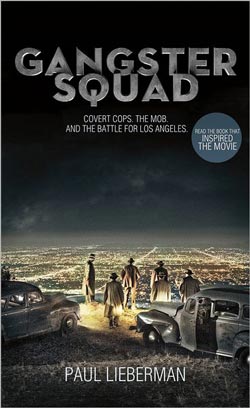
In the late 1940s, a secret squad was created inside the Los Angeles Police Department. Eight men were tasked with keeping “eastern hoodlums” from taking over L.A. The “Gangster Squad” were ghosts: “They’d meet on street corners, in parking lots, and up in the hills. In effect, they would not exist.”
Gangster Squad: Covert Cops, the Mob, and the Battle for Los Angeles by Paul Lieberman explores the largely untold history of this secret unit and is the basis for the film Gangster Squad, starring Sean Penn, Ryan Gosling, Emma Stone, and Josh Brolin, which was recently pushed back to a 2013 release. Lieberman’s book is based on his seven-part series for the Los Angeles Times in 2008.
The best part of Gangster Squad is that it feels like a new cops and robbers story. We’ve seen similar fictionalized tales, such as L.A. Confidential by James Ellroy. Also, “The Hat Squad,” a different secret group within the L.A.P.D.’s robbery division, has been the subject of multiple films and a TV show. Yet the “Gangster Squad” and the mobsters they went after have largely stayed under the radar.
Lieberman’s book tells the true story of how a group of tough-as-nails cops took down Mickey Cohen, the man secretly running Los Angeles.
Okay, so maybe Cohen wasn’t actually running Los Angles, and maybe those cops only sort of took him down. But either way, Cohen made a lot of money and had a vast criminal empire stretching from . . .
Okay, so maybe his criminal empire was less than vast, but he certainly was doing lots of criminal stuff. All this is just to say that while Gangster Squad might not tell an epic story—there’s no key shoot-out or brilliant, heart-stoppingly suspenseful sting—that’s not necessarily a bad thing. Instead, Gangster Squad is more like a collection of vignettes showing the cops doing their hard-nosed best to harass criminals and keep L.A. from falling to the Mafia.
Many, if not most, of the tactics the Squad used to chip away at Cohen’s power would be illegal today, and much of it was illegal then. As Lieberman says, “They stole guns and address books from mobsters and left anonymous messages, not loving chocolates, on their pillows. There were close calls—grand jury investigations, lawsuits, and a skeptical police chief or two…”
If news broke today of a secretive squad of cops tapping phones and planting bugs without warrants, beating up suspects they couldn’t arrest, harassing people without evidence of wrongdoing, and generally acting like they owned L.A., people would be outraged. But this happened decades ago, so instead we get Josh Brolin playing a man whose signature technique was driving people out to Mulholland Drive, putting his gun deep in their ear, and threatening to pull the trigger.
Yet, despite the obvious ethical and constitutional questions, there’s no denying the appeal of the Squad’s swagger and style. Anyone who’s seen the gorgeous trailer for the film would agree. While Lieberman’s writing is mostly restrained, welcome strains of Raymond Chandler can clearly be heard: “In this world, truth was found not in the sunshine but in the shadows. Justice was obtained not in a marble courthouse but in the streets and alleys.”
One of the problems with the book, although it’s not the author’s fault, is that it seems like the Gangster Squad doesn’t actually arrest a lot of people. The typical omerta code of silence comes down and the big fish slip away. Instead, the Squad mostly busts small-time bookies and thugs. When they do take down a major figure they’re convicted on tax charges, cursing in front of women, blocking traffic, or having sex with their mistresses. These are the big triumphs? Ironic, but not always thrilling.
Toward the end of the book Sam LoCigno, an associate of Mickey Cohen’s, is convicted of murder. Lieberman, to his credit, doesn’t try to amplify or exaggerate the LAPD’s arrest record: “their conviction of Sam LoCigno [in 1960] stood as the twentieth century’s first, and only, in a Los Angeles mob killing.”
All of which points to part of the reason why most gangster films, either those based on real life or completely fictional, take the criminal’s point of view. Police work involves paperwork, sitting in parked cars, and getting frustrated when witnesses disappear or change their stories. Important to society’s continuing function? Yes, of course. But not automatically the stuff of gripping drama.
Yet the charm of Gangster Squad lies in the smaller stories, not in the big plot.
It’s interesting and fun to read about how the squad bugged headboards, or how one criminal family, while migrating to L.A. in the early 20th century, bilked small-town folks in pool halls. Lieberman also delves deep into the past and family histories of each squad member, who become living, breathing figures with complicated personalities.
Ultimately, the Mafia never really established a stronghold in L.A.’s construction trades, sanitation services, or race tracks. The efforts of the squad likely played a key role. Although about that 1960 conviction, the first in a mob killing in L.A.’s history—it was later overturned due to how a member of the Gangster Squad handled the evidence.
See all our Gangster Squad coverage.
See our full coverage of new releases with our Fresh Meat series.
Richard Z. Santos lives outside of Austin and is enrolled in the MFA program at Texas State University. Once, he worked in Washington, D.C., but now he doesn’t do much more than write and teach. He blogs at Paperclip People, and is working on his first novel—a crime thriller set in New Mexico.
